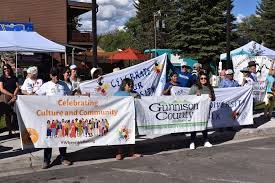Introduction:
In an increasingly interconnected world, the phenomenon of migration has led to the formation of diverse and vibrant "Newcomers' Communities." These communities play a crucial role in aiding immigrants' integration, providing social support, and preserving cultural identity. In this article, we delve into the significance of Newcomers' Communities, their characteristics, and the positive impact they have on both newcomers and host societies.

Understanding Newcomers' Communities:
Newcomers' Communities are social networks comprised of individuals who share a common background, often based on their country of origin, language, culture, or even shared experiences. These communities serve as a bridge for newcomers to connect with others who have undergone similar challenges and transitions. Their formation can be spontaneous or organized, with a focus on providing a sense of belonging and assistance during the adaptation process.
Key Characteristics:
- Cultural Preservation: Newcomers' Communities act as custodians of cultural heritage, helping immigrants retain their traditions, languages, and values. Through cultural events, language classes, and celebrations, these communities ensure that their rich heritage is not lost in the process of assimilation.
Social Support: Relocating to a new country can be daunting, but Newcomers' Communities offer a safety net of emotional, practical, and informational support. Whether it's advice on navigating bureaucratic processes or simply lending a sympathetic ear, these communities offer the comfort of familiarity in an unfamiliar setting.
Professional Networking: Many Newcomers' Communities facilitate networking opportunities for their members. They provide a platform for newcomers to connect with established professionals, exchange insights, and access job opportunities that may otherwise be difficult to find.
Community Development: These communities often engage in initiatives that benefit both newcomers and the broader society. From cultural festivals that promote cross-cultural understanding to community service projects that demonstrate a commitment to the local area, Newcomers' Communities contribute positively to their host societies.
Impact on NewcomersReduced Isolation: Moving to a new country can be isolating, but Newcomers' Communities offer a ready-made social circle that understands the challenges of integration.
Cultural Adaptation: By preserving cultural practices and providing a familiar environment, these communities ease the transition and help newcomers adapt at their own pace.
Empowerment: Joining a Newcomers' Community can boost newcomers' self-esteem and confidence by connecting them with others who have faced similar challenges and succeeded.
Positive Implications for Host Societies
Enriched Diversity: Newcomers' Communities contribute to the diversity of host societies, fostering cross-cultural interactions that lead to greater understanding and tolerance.
Economic Contributions: By aiding newcomers' integration into the workforce, these communities contribute to the economy by utilizing the skills and talents of immigrants.
Social Cohesion: Strengthened social bonds within Newcomers' Communities can translate to increased community engagement and cohesion within the larger society.
Challenges and the Way Forward
While Newcomers' Communities offer numerous benefits, challenges such as potential isolation from the wider society and the risk of perpetuating cultural insularity must be acknowledged. To maximize the positive impact of these communities, efforts should be made to encourage their integration into the larger social fabric while preserving their unique identities.Conclusion
Newcomers' Communities play an invaluable role in shaping the experiences of immigrants in their new homes. By offering a sense of belonging, cultural preservation, and support, these communities facilitate smoother transitions and enrich the fabric of host societies. As we move towards an even more interconnected world, recognizing and nurturing the role of Newcomers' Communities becomes imperative for fostering inclusive and vibrant societies.